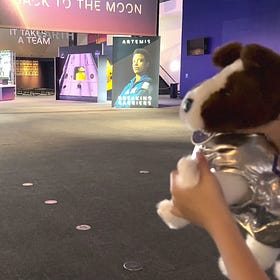Dear Classical Wisdom Kids,
We are re-arranging the schedule... and hoping to stick to it ;-) Let’s see if the stars will align...
This week we’ll begin with our Ancient Greek Word of the Week before commencing to our lesson, which will be on the Myth of Atlantis (Kids Club Members - keep a lookout!)
We’ve also got a few extra goodies for you, as indeed, this week we have plenty of words! We’ll focus on one (astron), but so many words are made up of other words that it’s hard not to discuss more...
Don’t worry and don’t get overwhelmed. They will all be repeated and within a few weeks you’ll see and appreciate how they all combine and mix and match... and how you can use them in our modern world.
Since there are so many, I’ve included a few worksheets to practice them as well as our star word to trace!
So for today we’ll shoot off into the stars and learn quite a few ancient Greek inspired words that are out of this world.
All the best,
Anya Leonard
Founder and Director
Classical Wisdom and Classical Wisdom Kids
P.S. Want more planets, gods and games? Enjoy our Members’ Ancient Space Challenge here:
Ancient Space Challenge!
Dear Classical Wisdom Kids, Time to bring the past to the future! One of the coolest things about learning about the ancient world is seeing references to it everywhere... even in space! We talked last week about WHY the planets are named after the ancient gods and goddesses... So now it’s time to practice the names of the planets as well as their order. We have a LOT of fun worksheets as well as group and individual games below (Planet Dress Up, anyone?).
Blame it on the Stars!
by Eugenia Manolidou, director of Elliniki Agogi
In the vast expanse of the cosmos (in Greek «κόσµος», meaning “order” or “jewel”), the Greeks found inspiration in the celestial bodies and created the word «ἄστρον» (ástron - meaning “star”).
You may not be surprised to learn that many, many words relating to space come from ancient Greece. Let’s see how this celestial connection unites language, culture and science! Today we’ll look at a few of them:
Astronomy
The term “astronomy” is the study of stars and celestial phenomena (the Greek «φαινόµενα» is pronounced exactly the same.) Derived from «ἄστρον» and «νόµος» (nómos - meaning “law” or “arrangement,”) astronomy explores the laws about the cosmos and evolved from ancient observations to a sophisticated field.
Telescope
The word «τηλεσκόπιον» (tilescópion, from «τῆλε», “far” and «σκοπῶ» “to look closely,”) helped astronomy tremendously with the invention of the telescope. This instrument allowed people to discover the details of stars and galaxies previously invisible to the naked eye.
Astrology
Beyond scientific exploration, the Greeks ventured into the mystical realm of “astrology” («ἀστρολογία»), where celestial bodies' positions at birth are thought to influence events here on earth. The word “horoscope,” from «ὡροσκόπος» (hοroskόpos), combines “time” (ὥρα) with the same verb found in “telescope,” σκοπῶ, offering personalized insights into personality and future, based in celestial positions.
Even the word “disaster” finds its roots in the Greek “δύσαστρον” (dísastron), from “δύς” meaning “bad” and “ἄστρον” (we know what this term means! ), showing us that people believed that unfavorable events were influenced by the planets and the stars.
Greek-derived terms form a linguistic bridge to the world’s ever-lasting fascination with stars. From the precision of astronomy and the allure of astrology, to the capabilities of the telescope and the predictions of horoscopes, these terms shape our exploration and understanding of the cosmos.
So, the next time life takes an unexpected turn, one might playfully exclaim, “Blame it on the stars,” as appreciation to the enduring influence of celestial words on our human experience.
Activities
Cosmic Word Hunt:
Create a list of celestial terms mentioned in the article, such as “star”, “astronomy,” “telescope,” “astrology,” “horoscope,” and “cosmos”... if you can’t find them all, use the PDF we provide below:
Practice Writing!
Can you write them in Greek? If you are new to Greek, practice with our Star word in this PDF:
Word Search:
Do you know any other English words relating to these? Find all the ancient Greek inspired star terms in this week’s Blame it on the Stars Word Search here:
Let us know what you think! We’ll work on our traceable worksheets a bit more.. this is a test run ;) We are ALWAYS happy for feedback - good, bad, and stinky!







